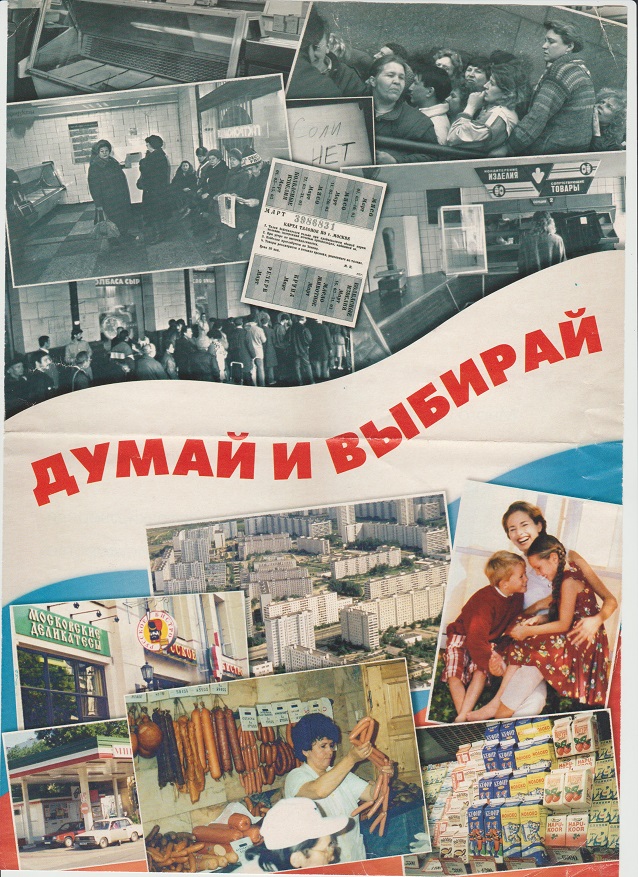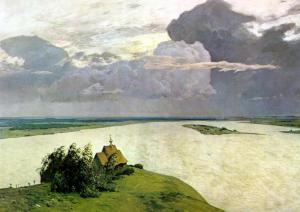I was an election observer when I was stationed in Russia on the 1996 Presidential election. I guess I’ve been thinking a lot about elections these days and I just remembered this anecdote. This was during the first round of the election.
In those days the rules were that a ballot box, together with officials and observers would be sent to isolated places and there the people would vote. I decided it would be interesting to follow one of these boxes and see what happened. I can’t remember exactly where it was, somewhere near Odintsovo in Moscow Oblast I think. Anyway, we followed the procession out to the village where the people were waiting for us and one by one they showed their identification and voted. One of the villagers, no doubt curious to see a car with a diplomatic licence plate, came over to ask who I was and what we were doing there. After I explained that we were one of the international observer teams all over Russia, we talked for a bit. He appeared to be in his sixties and he told me that he had lived in the village all his life and that conditions there had been pretty crummy for most of the time. He thought something might be getting better in the 1960s – I assumed he was referring to the Lieberman reforms – but that was a disappointment too. There wasn’t much hope left for him, he said, but things might be better for his children. And that was why he was voting for Yeltsin.
The rule was that the travelling boxes had to be counted first so I made sure that when the count began we were in the voting centre to which the box belonged. I wasn’t surprised to see a solid majority for Yeltsin from that box and I concluded that the man had given voice to the general feelings of the villages and other places the box went to (I remember a hospital as one of them).
There were a lot of hot-shot American election handlers in Russia in 1996 and some of them came home and boasted that they had got Yeltsin elected. There’s even a Time magazine story about it: Yanks to the rescue. Well I’m not so sure. I spent a lot of time analysing opinion polls as they developed over the campaign and I saw that the numbers for Zyuganov started pretty high – something over a third – but, over time, there was little change, neither up nor down. On the other hand, there was a steady drain from the other candidates to Yeltsin. I knew that the communists certainly would turn out and certainly would vote for Zyuganov and everybody else knew it too. Therefore, I interpreted the polls as showing that, one by one, Russians came to understand that if you didn’t want the communists back you had to vote for Yeltsin. Whether you liked him or not. Effectively, to vote for anybody but Yeltsin was to vote for Zyuganov and the communists and everybody had been there and seen that already. In my report at the time I said: “So the fundamental facts are these: Yeltsin is the only man who can stop the communists and Zyuganov is doing nothing effective to broaden his base from those who supported him in December” and “This election will be about the lesser of two evils and, at the moment, and with the dynamic of the situation, Yeltsin appears to enjoy that status”.
So I often think of what this guy told me because it was an actual face-to-face confirmation of what I had already deduced: for all his inadequacies, the only path to a better future ran through Yeltsin. Flashy advertising had no effect on that decision. (And, by the way, the flashiest ads I saw were not for Yeltsin but for Lebed.)
And, you know, my guy was perfectly correct: the future did run through Yeltsin and I’m sure that he – if he’s still alive a quarter of a century later – would feel that he made the right choice and I’m sure his children and their children do too.
(Speaking of elections. In Russia then voters had to identify themselves, scrutineers from all the parties were allowed – required – to see everything, if there was any problem with the travelling boxes, the whole box was thrown away. Ballots were strictly accounted for and were filled out by hand – no mysterious machines. In the sixty or seventy polling stations I was in over three elections sessions, I never saw anything suspicious. And the counts were completed pretty quickly too. Later transparent ballot boxes and CCTVs were introduced. But what do Russians know about elections?)
Here’s a Yeltsin poster from the election that makes the point. However dismal things were in 1996, people could remember the last days of the USSR and the empty shelves and the ration cards. The caption is “Think and Vote”.

